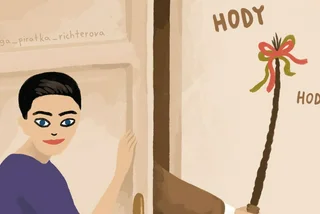A 2015 video clip from Irish talk-show host Graham Norton sees guests on a British discussion program jokingly comment about Czechia’s Easter Monday “whipping” tradition. However, as viewers may attest, not everything they say is necessarily true.
“My fiancé is from the Czech Republic, and a big tradition there on Easter Monday – and this is fact – is that the girls beg to get whipped,” said Andrew (a guest on the show) light-heartedly to the shock, amusement, and even disbelief of the other participants and audience.
Following this, another guest on the show – Petra, from Czechia – agreed with Andrew. “It’s true. We’re begging to be whipped on Easter Monday, but only on this day. It's tradition on Easter Monday that if you get whipped, you’ll remain beautiful and healthy for the upcoming year,” she remarked.
Both Andrew and Petra are, of course, referring to the Czech Easter tradition of pomlázka – the tradition of (usually gently) spanking girls with decorated willow twigs (usually with colored ribbons) on Easter Monday. How much of what the guests say is actually true, though?
A long, gendered history
We need to go back to the 14th century to uncover the first mentions of pomlázka in central Europe – when lovers would slap each other with brooms or their hands – but the Easter folk custom did not properly develop and become popular in Czech lands until the 18th and 19th centuries.
The tradition sees men beating women with the stick on Easter Monday to ensure health and fertility, as Petra alluded to. Men receive eggs, sweets, or, even more frequently, a glass of slivovice (plum spirit) in return. Although not widely practiced, leap years “allow” the roles to be reversed and let women take the chance to spank men.
In the past, women also paid off the whippers by pouring water on them, a tradition that has gradually died down.
Do women really want to get whipped?
But is it fair to say that women in Czechia “beg” to get “whipped” on Easter Monday? The answer is a pretty firm no. While the tradition was practiced more intensely a century ago, the pomlázka tradition is merely symbolic today. Using the word “whipped” is also largely inaccurate – any spanks given are usually gentle and more akin to taps.
It is reasonable to say, though, that the tradition is more seriously and widely practiced in Moravia and further east of the Czech Republic, including in smaller villages and towns. Over there, boys and men may show less mercy to their female companions when yielding the willow stick.
Some people have called for an end to the widespread continuation of the tradition in Czechia, citing a combination of physical pain and also gender-based unfairness (and awkwardness). Last year, Deputy Speaker of the Chamber of Deputies Olga Richterová reminded Czechs that "no means no," even during the Easter tradition.
Interestingly, a public opinion survey on pomlázka from last year by NMS Market Research found that 44 percent of women experienced pain being hit by the twigs, one-quarter had bruises or other marks on their skin, and 10 percent described feelings of humiliation. Just one in four said they experienced no negative emotions after the event. One-third of women went as far as to say they “hate” the tradition – not exactly a sign of begging to be spanked.
Misunderstanding a cultural tradition
Many commenters on the video also pointed out the guests’ inaccuracies. “This is a huge misunderstanding and misinterpretation of this tradition…men slightly and painlessly flick women with willow twigs…other nations think we have a tradition of beating women,” said one viewer.
“Foreigners: it's just a gentle slapping with a rod of willow – no bruise, no blood, no meat flying in the air,” said another person.
One viewer explained why the talk-show guests may have used their certain choice of words: “The begging depends on a region. I am from Moravia – here we have a sort of unspoken competition among us girls. The one who got whipped by most guys was considered the one most desired.”
The clip underlines some common misconceptions about the centuries-old tradition and its harshness, but simultaneously serves to remind people that women do not necessarily "beg" – or even want – to be hit every Easter Monday.












 Reading time: 3 minutes
Reading time: 3 minutes 























